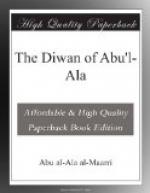It was an ancient custom of the Arabs when they took an oath of special significance to plunge their hands into a bowl of perfume and distribute it among those who took part in the ceremony. Of the perfumes, musk (quatrain 38) was one which they affected most. Brought commonly from Turkistan, it was, with certain quantities of sandalwood and ambra, made into a perfume. And “the wounds of him who falls in battle and of the martyrs,” said Mahomet, “shall on the Day of Judgment be resplendent with vermilion and odorous as musk.” This was repeated by Ibnol Faradhi, who in the Kaaba entreated God for martyrdom and, when this prayer was heard, repented having asked. . . . This quatrain goes on to allude to things which can improve by being struck. There is in the third book of a work on cookery (so rare a thing, they tell us, that no MS. of it exists in England or in any other country that can be heard of) an observation by the eighteenth-century editor to the effect that it is a vulgar error to suppose that walnut-trees, like Russian wives, are all the better for a beating; the long poles and stones which are used by boys and others to get the fruit down, for the trees are very high, are used rather out of kindness to themselves than with any regard to the tree that bears it. This valued treatise, we may mention, is ascribed to Coelius Apicius; its science, learning, and discipline were extremely condemned, and even abhorred by Seneca and the Stoics. . . . Aloes-wood does not emit a perfume until it is burned:
Lo! of hundreds
who aspire
Eighties
perish—nineties tire!
They who bear up, in spite of wrecks and
wracks,
Were season’d by celestial hail
of thwacks.
Fortune
in this mortal race
Builds on
thwackings for its base;
Thus the All-Wise doth make a flail a
staff,
And separates his heavenly corn from chaff.[8]
Reward may follow on such absolute obedience (quatrain 40). We remember what is said by Fra Giovanni in the prison of Viterbo[9]: “Endurez, souffrez, acceptez, veuillez ce que Dieu veut, et votre volonte sera faite sur la terre comme au ciel.” And perhaps the dawn for you may be your camel’s dawn (quatrain 41); it was usual for Arabs on the point of death to say to their sons: “Bury my steed with me, so that when I rise from the grave I will not have to go on foot.” The camel was tied with its head towards its hind legs, a saddle-cloth was wrapped about its neck, and it was left beside the grave until it died. Meanwhile, if the master is a true believer, says Mahomet, his soul has been divided from the body by Azrael, the angel of death. Afterwards the body is commanded to sit upright in the grave, there to be examined by the two black angels, Monkar and Nakyr (quatrain 42), with regard to his faith, the unity of God and the mission of Mahomet. If the answers be correct, the body stays in peace and is refreshed by the air of paradise;




